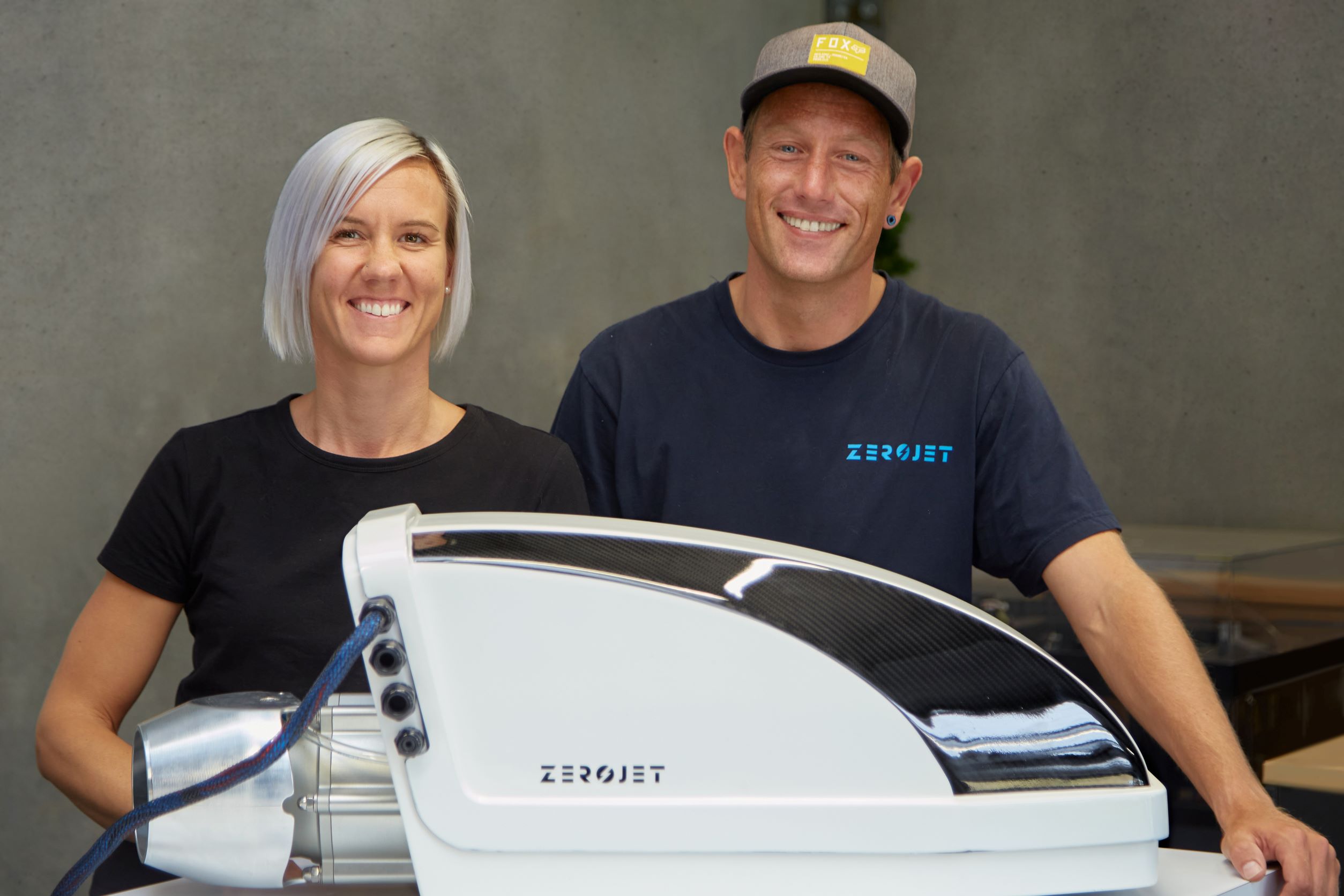Bex Rempel and Neil Mans have an audacious goal of eliminating the need for combustion engines on small watercraft around the world. Their company ZeroJet has already made significant progress in export markets.
Bex Rempel and Neil Mans (pictured) are self-confessed adrenalin junkies with complementary personalities and skillsets. A chartered accountant and qualified engineer by trade respectively, their first major business experience was in Perth buying, selling and renting motorised surfboards.
A desire to migrate to a technology that had less impact on the environment saw the couple return to New Zealand in 2015 to launch Voltaic Jetboards and spend the next two years developing high-performance electric jetboards.
A team of four engineers, all ex-Buckley Systems, produced a bespoke jet pump design paired with an electric motor and custom hull design using their hydrodynamic expertise. The result was the world’s fastest electric jetboard capable of speeds up to 70kph.
Subsequent interest from boat builders saw the team pivot towards electric jet systems for boats and by 2019 the first prototype electric jet tender was completed.
A rebrand to ZeroJet the following year and successful seed capital raise resulted in the world’s lightest electric jet tender as well as a highly efficient jetpod system for three to four metre boats. ZeroJet went public and a keen marine industry began buying their tenders.
Today Bex and Neil can look back on a remarkable journey, and know that they have the product to address the environmental impact of traditional petrol-powered outboard motors on the marine environment. The couple now have an audacious goal of eliminating the need for combustion engines on small watercraft, initially tenders and dinghies. They have the compact-yet-powerful technology and the tenacity to pull it off.
Looking back, they liken their journey to a ‘rollercoaster from the 1920s, an exciting adventure’. Bex remembers how tough it was to raise funds in the early days, when investors preferred to back software start-ups that would deliver quick returns.
“We’ve had several successful funding rounds now, but we’ve also had many failed attempts,” she recalls. “Thankfully the landscape has changed dramatically in the past few years, and it’s fantastic to see the level of funding now being invested in New Zealand’s tech startups – particularly up-front capex for the likes of deep-tech, agritech, climate and clean-tech companies.”
Tech firms developing new hardware, like ZeroJet, can struggle to attract investment, Bex says, and it’s not helped by all the Covid and supply chain disruptions.
She says fund-raising never really gets easier as a company grows. “However, going down the external funding route, such as VC or angel funding, forces you to really evaluate your business. It’s a good health check.”
She’s also pleased to say that the covid pandemic didn’t affect their funding plans. When covid hit the country, they had cash in the bank and were working behind closed doors in R&D mode. Although in more recent times, there have been some supply issues to navigate.
Building relationships
Bex and Neil’s advice for other start-ups is to start building relationships with potential backers even before you’re ready to raise capital.
“Start networking, attending events and meeting people,” says Bex, “and build a database of investors you can give regular updates to.”
Investors want to see you’re genuine, you set goals and provide feedback on milestones hit or missed, she says. “Over time it all builds trust and credibility, so when you’re ready to raise money, you already have the right people following you.”
Bex also recommends that start-ups take certain advice “with a grain of salt”.
“Some investors may give the impression that they know everything. But they’re not necessarily experts in your field.
“Listen to advice, take some of it on board, but filter out what’s not relevant,” she says.
“It’s also important to do due diligence on investors. I believe partnering with an investor is more of a commitment than a marriage. So, make sure you gel really well, and can see a long-term partnership working.
“And ask if you can talk to any other business owners the investor has backed.”
Big goals
ZeroJet’s founders know how to think big – their ultimate goal is to power more than a million boats worldwide. “We plan to become a household name,” says Bex. “Just as brands like Yamaha and Honda are known for outboards, we want ZeroJet to be the name synonymous with electric propulsion.”
They’re already off to a flying start, with around 80 percent of sales to offshore customers.
Are they inspired by any other techpreneurs who’ve gone before them and set an example to follow?
“Well, with Neil originally from South Africa and me from Canada, it’s probably no surprise that we look up to Elon Musk,” says Bex. “He was a visionary as a kid growing up in South Africa, and while attending university in Canada.”
The coincidence is not lost on the two ZeroJet founders.
This article is an extract from the 2022 August Quarterly edition of NZBusiness.




